
The Eligibles: (l-r) Stan Farber, Ron Hicklin, Ron Rolla, Bob Zwin
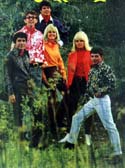
The Love Generation
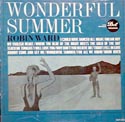
Wonderful Summer
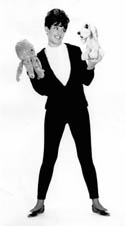
Publicity Photo
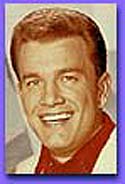
Wink Martindale
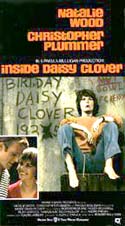
Inside Daisy Clover
Sound Byte Coming Soon!
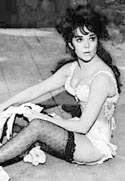
Natalie Wood in The Great Race
Sound Byte Coming Soon!
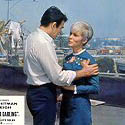
Jackie sings for Janet Leigh
Sound Byte Coming Soon!

Shorty Rogers
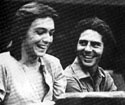
David & Wes
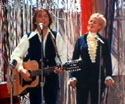
The Partridge Family
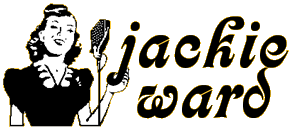
Continued...
GH: How did you meet the other Partridge Family singers?
JW: I first met Ron when he was singing with a group called The Eligibles on Shindig. Jimmy Haskell was a composer and my husband was working with him at that time. Girl trios were big then, and if Jimmy needed a trio to sing on the show, he would call me and I would get the trios for him. On occasion, he would need male quartets as well, and he used The Eligibles, which consisted of Ron, Stan Farber and Al Capps. So I met Ron when Jimmy had a gig and needed three girls and four guys.
GH: At what point did you meet John and Tom Bahler?
JW: When John came to town he had been with The Love Generation. Ron and I were already working. John was trying to get started as a studio singer. Ron had said, "This guy is really good. You should try him on something when you have the opportunity." So I called him in for a U-Haul commercial I was putting together. This was at a point when he was taking any job he could find to get himself established. I think he had some kind of writing gig and had been up all evening the night before. So when he came in at 9AM, we ran through the music a few times. But when we actually recorded, the take they decided to keep was one where he had drawn a blank ≠ as you do sometimes when you are exhausted. He stood there and just lip-synched the song! It wasnít until years later that he told me ≠ he was so embarrassed!
GH: After a while, did clients ask you to assemble the singers?
JW: Oh, sure. I put groups together all the time. Ron and John did as well. After a while, Tom did too. Because we all had certain composers that we worked with, they might ask us to put the singers together. Most of the time we would call each other. Sometimes not, depending on the sound you wanted. We were all contracting singers at that time.
GH: Were you working with any pop stars prior to The Partridge Family?
JW: I know I did many major things. I did a lot of Mama Cass stuff. But prior to all of the pop stuff, Pat Boone had a hit record with a song called "Speedy Gonzales" and I was the voice of Speedy. It was very funny! That was much before some of this stuff we have been talking about. I also had a hit record of my own!
GH: You did?
JW: Yes, it was under the name Robin Ward, and it was called "Wonderful Summer". Robin was my daughterís name and I used it on the record because I sounded like a 16 year old. I was getting fan letters from 16 year old boys, and of course I couldnít go out and meet them, because I wasnít 16! But that was a very big record. I think it got up to #8 on the charts in 1963 ≠ right around the time I was doing the Yogi Bear movie. Then the Beatles hit, and that was the end of everything. It was a novelty thing at the time anyway.
GH: How did that all happen for you?
JW: Perry Botkin was a composer I worked with all the time. He had written a song, and wanted me to record a demo of it. He was playing it, and singing it like John Raitt. I asked him who he was pitching the song to, because he was singing it as if it were a Broadway tune. It sounded to me like a wonderful song that a teenager would sing: "I want to thank you for the most wonderful summer of my life". I told him I could make it into a young kidís song. So I sung it and when we were cutting the demo, we could tell something magical was happening. We knew it could be a hit record. And it was.
GH: Did you follow it up with an album?
JW: The single was released on Dot Records, and because it was a hit, we did an album called "Wonderful Summer". That was the only solo record that I did as Robin Ward, although I also sang a duet with Wink Martindale because he was a Dot Recording artist as well. Dot thought it would be a good idea to put us together since I had just had the hit record.
GH: Why didnít you keep it going?
JW: Frankly, to sing like a little girl wasnít something I really wanted to keep† doing. It was successful and it served the purpose. I was older than 16 so my photo wasnít even used on the record, and I certainly couldnít go out and tour to promote it, so that was that.
GH: It seems there was quite a lot of "innocent" deception going on with recordings at that time.
JW: Oh sure! Iíll tell you another story. Natalie Wood was doing a movie called Inside Daisy Clover. Well, thatís not her singing, itís me. Andre Previn wrote the music. Robert Redford was just becoming a star. The director said it sounded absolutely gorgeous, but not right for the character, who was sort of a street kid who has a raw talent but not so polished. So I had to go back in, and re-record it and make it sound not so good. This was a musical! Daisy Clover was an up and coming musical star in Hollywood in the 30s.
GH: Was there more than just this one song?
JW: There was a whole score, because it was about a musical star.†
GH: What was it like to work with Natalie Wood?
JW: Natalie wanted to sing it herself and she tried to do it. Apparently, it was really bad. I had heard stories before I came in and auditioned, but who really knows what to believe? They auditioned about 200 singers and I had an inkling of what they wanted. She never wanted to meet me. Never wanted to know anything about me. She didnít want to know I even existed. It was kind of sad. I didnít know this till later. I went in and recorded live with the full orchestra. After I finished, they played it back and the orchestra was applauding me. I couldnít figure it out. Then Andre told me that Natalie had evidently tried to sing it earlier. The orchestra was so thrilled that someone came in that could sing it that they applauded!
GH: Did it bother you that it was your work getting noticed, but someone else was getting the credit and benefiting from your talent?
JW: Not really, because by then I had come to the realization that I was doing something that was very unique. I could walk down the street and not be bothered by anybody. The ideas I may have had in the beginning about being a star myself kind of faded because if you start having success, your life changes dramatically.
GH: And since you had worked with so many stars, you could see that fame wasnít as rosy as everyone might think.
JW: Absolutely.† I also sang for Natalie Wood in The Great Race. "The Sweetheart Tree" was the name of the song. And I sang for Janet Leigh in a movie called American Dream with Stuart Whitman. It was a Johnny Mandel song called "A Time For Love".
GH: How did you all come together for The Partridge Family?
JW: In the beginning, the producers had hired Shorty Rogers to do the music and Ron Hicklin was hired to put the group together. This was for the pilot. The stuff that Shorty did was very nice. There were 3 girls and 4 guys. It was more like a Hollywood choir sound. A small group, like a background choir type sound.†
GH: Ron gave us the recording schedules for those days, which† shows you as the only female voice. Tom & John Bahler, Ron Hicklin, Stan Farber and you.
JW: No. I remember Sally Stevens was there too, as well as another girl. And I remember that because when the pilot sold, the same people went in to do it when Wes Farrell came in. We had to audition for him.
GH: Do you know how/why Wes Farrell came in if Shorty Rogers was already in place?
JW: As I recall it, the producer of the television show wanted a more contemporary hit record-type sound. I donít exactly know how he got hold of Wes Farrell, but I have to give Wes credit for everything that happened musically.† He made it a real contemporary ≠ for that time ≠ sound. Wes knew what would sell. When we first went in there, we had the same 3 girls and 4 guys and we were singing it like we had sung the other stuff. Wes wasnít happy and wanted to try something different. It just wasnít sounding right to him. So we tried all kinds of different combinations. Essentially, we were auditioning all over again. I kind of knew what Wes wanted, because I had been in the business for a while and knew how to adapt myself vocally for different styles of music. What we settled on was me and three tenors.†
GH: Did Wes Farrell replace Shorty Rogers?
JW: Yes, he did. Shorty was not only producing, but writing as well. But Wes wasnít a composer like Shorty was. So Wes used Mike Melvoin to write the different instrumental parts and John (Bahler) did most of the vocal arranging.† But Wes was the one who would say "yea" or "nea" and he was the one who would change things if something wasnít working.†
GH: We have heard that Wes was a difficult person to work for. He has been called everything from dictatorial, blunt, rude and demanding, to an absolute delight. What was your experience working with him?
JW: Well, he was all of those things, but it was generally in order to make a point. Because he knew what he wanted. He knew when he heard the right sound ≠ when we had arrived at what it should be.
GH: When was David brought in?
JW: It was my understanding from the very beginning that David was going to be singing.† I also know that the group -- specifically Tom -- was going to sing the parts that David couldnít reach because his voice wasnít developed enough. Thatís Tom who is singing Davidís lower notes. If there was a section of the song that was a little weak, they would beef it up with Tomís voice. It was ever-so subtle, but it was there because David didnít have the experience and the voice wasnít developed yet. It was good ≠ he had a natural talent and seemed to go in the right direction. He certainly worked well with Wes in the beginning. It just needed some reinforcing in the beginning, which is what the group did at times, or what Tom did at times.†